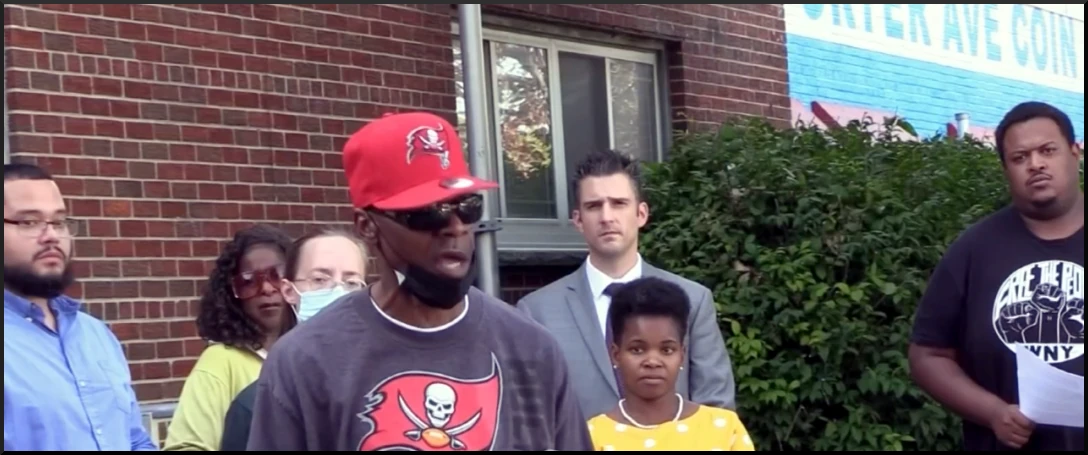by Ryan Lockwood, published on Workers World, November 14, 2021
Nov. 14 — Under normal circumstances, Buffalo’s mayoral election would have been little more than the 16-year incumbent Democrat Byron Brown’s coronation ceremony. But India Walton, who declared herself a socialist, interrupted the well-rehearsed proceedings with a stunning June primary upset against Brown. Both candidates are African American.
Walton ran on a platform of police reform and tenants’ rights. She had become a familiar face in activist circles during the George Floyd uprisings in 2020.
Instead of conceding after the primary, Brown launched a write-in campaign for the November ballot. All the conservative, pro-capitalist forces in Buffalo immediately coalesced behind Brown. The local news stations were happy to run Brown’s slanderous attack ads.
Carl Paladino, the arch-reactionary Buffalo real estate developer and early supporter of Donald Trump, announced his endorsement of Brown’s write-in campaign. The Republican Party of New York State crossed party lines to distribute thousands of mailers to voters urging them to “write down Brown.”
After three months of lies, treachery and Red-baiting, Brown pulled out an 18-point victory over Walton in the general election.
Limitations of electoral politics
Revolutionary Marxists can at no point expect an electoral victory to establish socialism. The U.S. electoral system was designed by and for the capitalist class as an instrument of class repression. In the early days of the United States, the vote was reserved for white men with property.
Subsequent progressive movements have opened up the right to vote to others (rampant and racist voter suppression notwithstanding), but they have been unable to change the fundamental class character of the ballot box. White men with property remain its prime beneficiaries.
Real socialism requires a fundamental break with the current social order; the workers must control the means of production and receive the benefits of their labor. The parasitic class of bosses, bankers and landlords is obsolete and can be tossed aside.
Most importantly socialism requires the organized working class to destroy the existing state apparatus and substitute its own. Walton’s campaign was certainly progressive and represented a clear break with the anti-worker, neoliberal political order, but it never left the realm of social reform.
Nevertheless, revolutionary Marxists can critically support a progressive but non-Marxist, working-class movement. Walton’s campaign reflected a great crying out from the most oppressed layers of the working class, represented both in Walton herself and in her base of support.
In the Nov. 7 Guardian, Walton clarified how she got where she is today: “The struggle. The struggle of being a Black woman, of being a teenage mother, of growing up poor and really experiencing so many tragedies and traumas.”
Most support among workers
With official results still pending, the data available suggests that Walton performed strongest in the working-class, non-white neighborhoods in the East and West Sides and weakest in affluent white neighborhoods in the North. To disregard these voices would be an error for a revolutionary organization.
Walton’s campaign was most successful in providing a barometer of public opinion and in building a highly visible platform. Some 41% of Buffalo’s voters embraced an explicitly pro-worker platform. This gives a reason for optimism.
Of course, Walton was not merely running a campaign to make a point. She was in it to win. Buffalo’s political establishment used every effort to prevent her victory.
Even if Walton had won the election, we could anticipate that powerful capitalist lobbies and a resentful, uncooperative police force would sabotage any efforts to introduce her progressive agenda in Buffalo. The U.S. government, at every level, is an apparatus of the dictatorship of the bourgeoisie. A mass struggle would be needed to win every point in her platform.
Revolutionaries view campaigns such as Walton’s as a means of encouraging more formidable organization and class consciousness among the workers. To that end, the campaign has already contributed something of great value to the movement. Byron Brown and his cronies would be unwise to gloat too loudly. Despite the electoral setback, it can provide a stepping stone towards ultimate victory.
